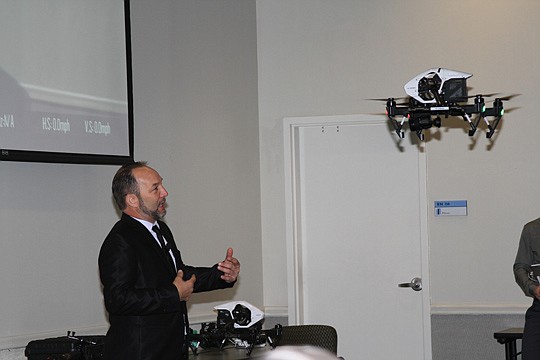
By Maggie FitzRoy, Contributing Writer
One of the first things agents learned at the Real Estate and Drones presentation last month was much of what was being shared would probably become obsolete.
Perhaps within six months because of the ever-changing technology and regulations, said Robert Jex, a representative from the Federal Aviation Administration’s Orlando Flight Standards District.
Jex also told attendees to become aware of the regulations if they planned to hire aerial drone videographers for their real estate business.
Federal regulations that went into effect in August required commercial drone operators to be licensed by the FAA. In addition, all drones must be registered.
The law was passed after a drone landed on the White House lawn, he said.
Drones have landed in the middle of races and tennis matches, leading the government to be increasingly concerned about public safety.
“If you are hiring an operator, ask them about their compliance,” Jex said. “Ask, ‘Have you registered your drone?’ And if they have, ask if they will share their registration numbers with you.”
The course was offered as a way to raise awareness for real estate because drones outnumber all other types of aircraft.
They have become so popular that “as of a week ago,” 7-Eleven stores were selling more drones than any other retailer, Jex said last month.
The FAA defines drones as unmanned aircraft that weigh just over a half-pound to 55 pounds.
They can be used in one of three ways: by governmental agencies, including police and disaster response teams; businesses for commercial use, such as those hired by real estate agents; and hobbyists.
People who fly a drone for a hobby do not need to be licensed, but once they start making money from it, they are considered commercial.
If someone wants to become licensed to fly a drone, they need to pass a written test, but do not have to demonstrate they can fly one.
That is one reason the laws are likely to change before long, said Obie Young, president of the National Aviation Safety Foundation.
The advent of drones is not new, he said at the NEFAR session.
There have been remote-controlled aircraft for many years.
What’s new, Young said, is the flight control systems are simplified so that just about anyone can fly one.
“That is putting more of them in the air, which is causing privacy concerns, as well as safety concerns,” Young said, adding commercial airline pilots are increasingly worried about colliding with one.
“We all know what birds can do,” when they fly into an aircraft, said Dan Foard, an Emmy Award-winning videographer.
He flew drones around the NEFAR classroom, shooting footage of attendees from slightly above their heads and projecting it onto a screen.
As a professional aerial videographer, Foard volunteers his time to teach drone safety awareness. “We try to teach common sense,” he said. “How to be a courteous drone pilot.”
He also treated the class to videos he’d shot around the world, including stunning aerials of boat races, fish hatcheries and people water skiing.
“This is a wonderful platform,” Foard said. “If we all just stick to the rules.”
The penalty for violating those rules is a civil fine, said Jex.
“Liability can be shared. So my advice is to make the contractor liable in your contract with them,” he said.
Jex also advised aerial videographers contact local police before they film an area to make sure they are in compliance with local laws as well as federal.
Jay Manno, a broker associate who owns his own business, said he has never used a drone photographer, but plans to for future higher-priced listings.
“I learned a lot that I can use,” he said.
Eleana Carrion, with Watson Realty, said she came to the class because luxury property owners who plan to put their home on the market are starting to expect drone photography.
Aerial videos of a home, especially one in a community of homes priced at $750,000 and above, are valuable marketing tools. And Realtors who hire drone videographers to create them have a competitive advantage.
Carrion said she learned from the course that “we have to know who we hire.”
Her next step: research area drone videographers who specialize in real estate.